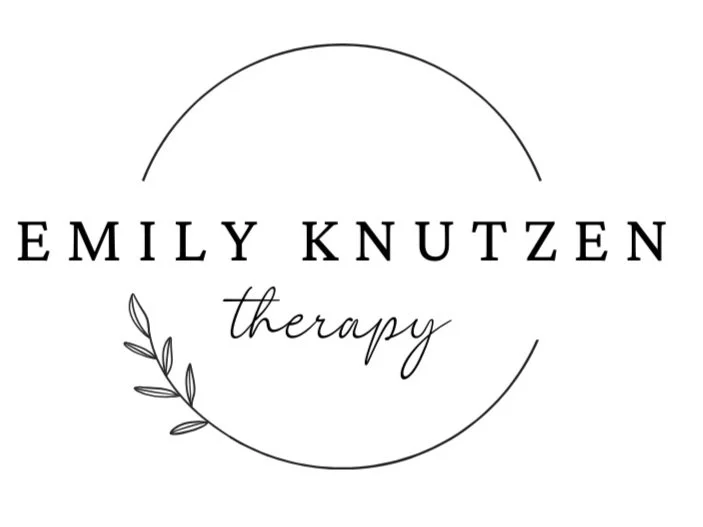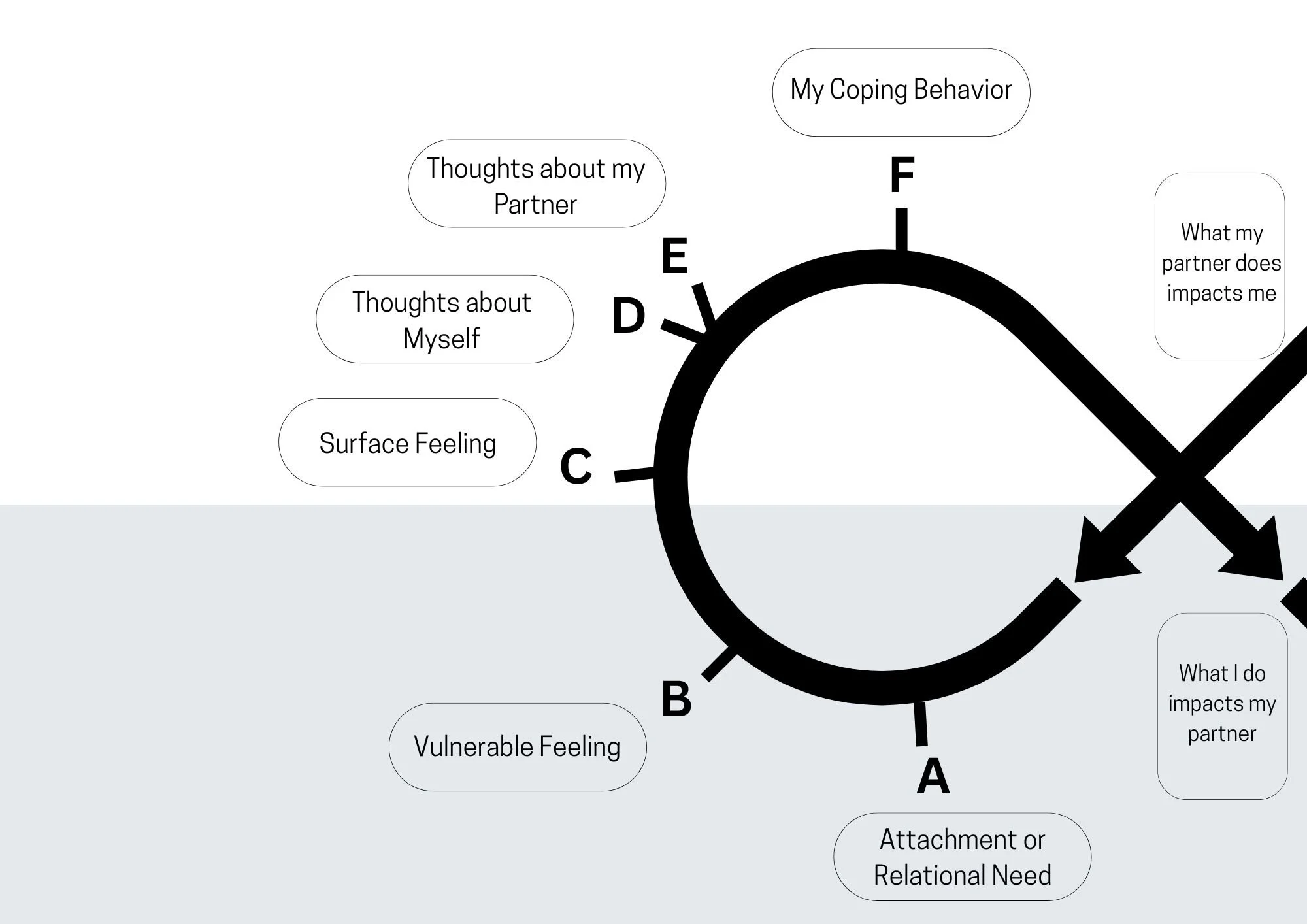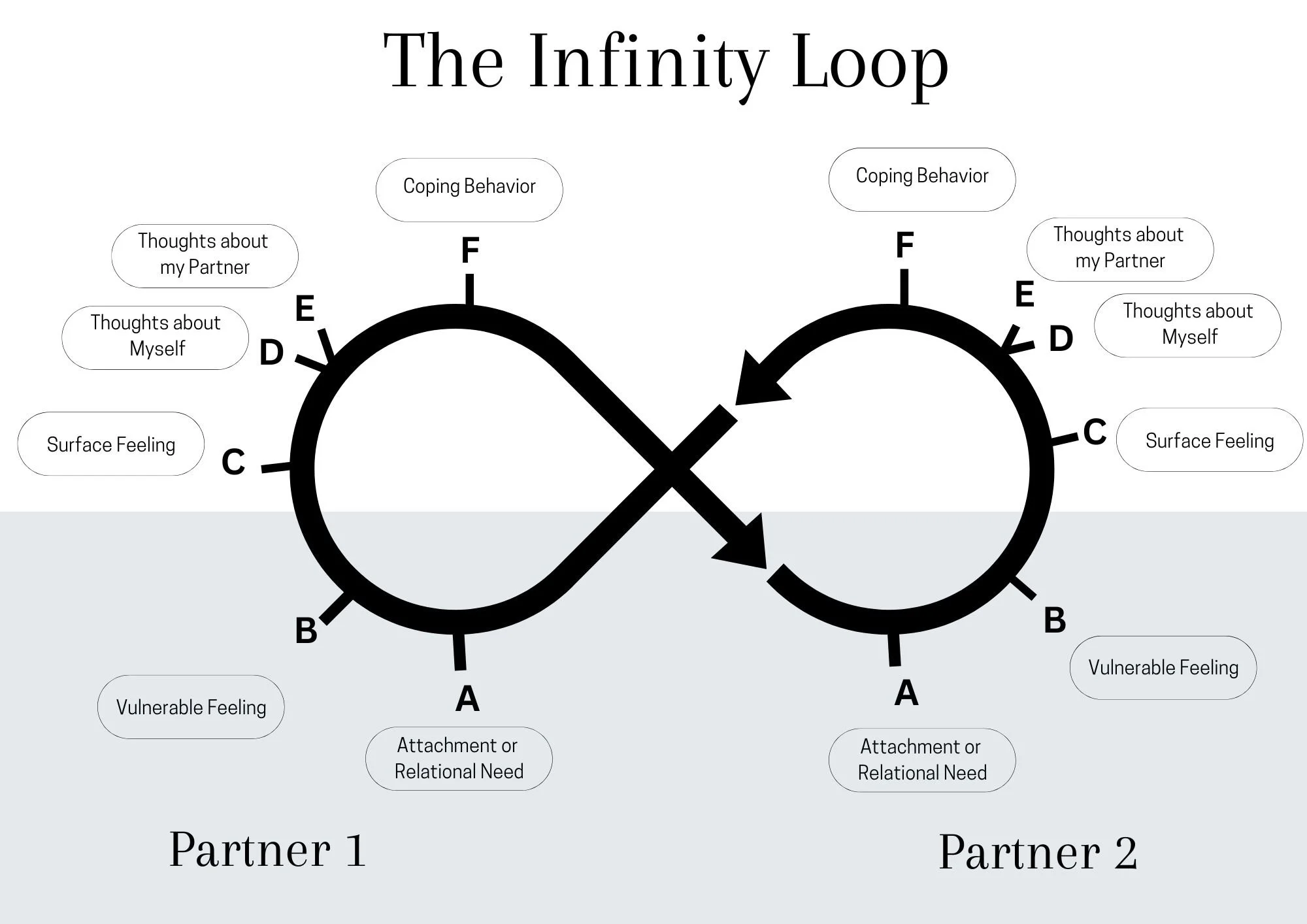Stop Having the Same Repetitive Arguments: How Emotionally Focused Couples Therapy Works
If you’ve been with your partner for very long, it might feel like you have the same argument over and over again - just in slightly different ways. You fight about the dishes one night and then bicker about plans with your friends the next weekend. It doesn’t quite make sense to you, but your fights have a familiar undertone and you end up feeling a similar sense of frustration and disconnection no matter what your conflict is about.
Understanding Repetitive Conflict: The EFT Perspective
When we look at repetitive conflict through the lens of Emotionally Focused Therapy (EFT), this familiar feeling makes a lot of sense. When couples fight, we tend to get stuck in a negative cycle of interaction called the Infinity Loop. This loop describes the way that we cope with conflict (shutting down, criticizing, defending ourselves, etc.) and the way that we think and feel in both obvious and more hidden ways (anger or shame, judgment or fear, etc). This familiar emotional loop can play out in all sorts of conflicts - so no matter what we fight about, the emotional pattern of the conversation can play out in predictable, familiar ways.
Emotionally Focused Therapy helps couples identify their Negative Cycle (often called the Infinity Loop), understand it more fully, and eventually, build tools to counteract the familiar pattern - stepping out of this negative interaction cycle to connect more deeply and create a more safe and secure bond.
The Core of Repetitive Fights: Your Negative Cycle (The Infinity Loop)
When you are fighting with your partner, there are patterns in the way that you interact with each other that often lead to hurt, disconnection, and misunderstanding. This interaction pattern, not you or your partner, is the real problem. It is this interaction pattern - called the Infinity Loop - that blocks you from understanding each other and connecting on a deeper level.
The Infinity Loop consists of two sides of an interaction pattern (one that is yours, one that is your partner’s) that feed into each other and keep conflict cycling. There are six components of these interactions that we work to identify in Emotionally Focused couples therapy to understand your conflict pattern.
The 6 Components of the EFT Infinity Loop - What’s Keeping You Stuck
F) Your Coping Behavior - this is what you do to care for yourself when conflict feels difficult. You may criticize your partner, defend yourself from blame, shut down and withdraw, placate, problem-solve, or any number of coping mechanisms to make conflict feel less bad.
E) Thoughts about Your Partner - these are the beliefs about your partner that push you into your coping behavior. Maybe when conflict happens, you believe that “my partner doesn’t really care about me” or “she always blames me for this.” Often, these thoughts don’t hold as much weight outside of conflict, but once we get in conflict mode, they feel big, looming, and threateningly true.
D) Thoughts about Yourself - these are beliefs about yourself that contribute to pushing you into your coping behavior. Maybe you start to think, “I am never going to be good enough” or “I’m alone in this.” These beliefs hurt, and often feel scary, pushing us to find ways to cope.
C) Surface Feeling - this is the feeling that someone might identify if they saw you looking through the window - the emotion your face and body language communicates, the protector emotion, the feeling that comes up first. These are called Secondary Emotions - in that they are emotions that come as a result of a Primary and more vulnerable emotion. Often, Secondary Emotions include feelings like anger, frustration, annoyance, or anxiety.
B) Vulnerable Feeling - this is the feeling that you probably really don’t want to feel - sadness, fear, hurt, shame, rejection. I often prompt clients to find this emotion by saying, “I feel _(secondary emotion)_____, because I feel ________.” For example, “I feel angry, because I feel….hurt, scared, betrayed.” Our vulnerable, primary emotion is the one that needs protecting - it feels difficult to feel or show in the midst of a fight, so we want to protect it with emotions that feel less vulnerable (as named above in Surface Feelings).
A) Attachment or Relational Need - this is the thing that we yearn for, the way that we are desperate to feel in our relationship. It’s not just that I want my partner to do the dishes, it’s that I want to feel valued and seen by my partner. It’s not just that I want my partner to make plans for us, it’s that I want to feel a sense of partnership and togetherness - that we’re in this together and I’m not alone. These needs are the core of why conflict feels so painful - the threat of these needs not being met is what causes the infinity loop to start on our side.
This negative interaction cycle is called the Infinity Loop because the way that we cope with conflict (see F) speaks directly to our partner’s relational need (see A). In fact, the way that we cope tends to tell our partner that their relational need isn’t going to be met, and vice versa.
For example, I may criticize my partner (F) to cope with conflict because I feel worried that my partner doesn’t really care about my needs (E). This will speak directly to my partner, who wants to be accepted (A) - I’m unintentionally telling them that they are not accepted when I criticize - and when that gets threatened, they feel rejected (B), anxious (C) and eventually completely shut down (F).
Shifting the Infinity Loop: How Emotionally Focused Couples Therapy Works
In Emotionally Focused Couples Therapy, we work together to identify your negative interaction cycle, exploring patterns of conflict and the way that you each cope, think, and feel. Rather than blaming either of you, we acknowledge that this cycle you’ve created together is what needs to change.
We work together to explore the underlying relational needs that are at the core of conflict and vulnerable feelings that are being missed. You’ll practice sharing from this vulnerable place and learn skills to slow conflict down in order to get to this soft, vulnerable place with each other in real time - taking action to contradict your negative interaction cycle and give each other the message that you see and care about each other’s needs.
Stop Having the Same Arguments
These negative interaction cycles are a human part of relationships - we all have learned ways to cope and care for ourselves when our relationships feel hard. The fact that these negative interaction cycles exist is NOT a sign of failure. Rather, it’s an opportunity to dig deeper into understanding the care that each of us need in intimate relationships.
For more support, couples therapy is a great way to be supported in breaking down and shifting your negative interaction cycles. Book a free consultation to finally stop having the same arguments!


